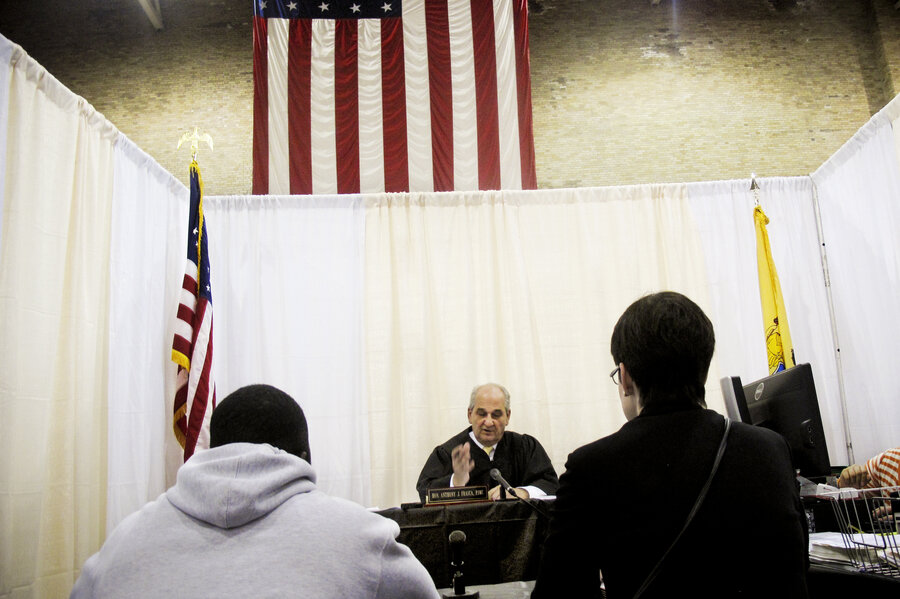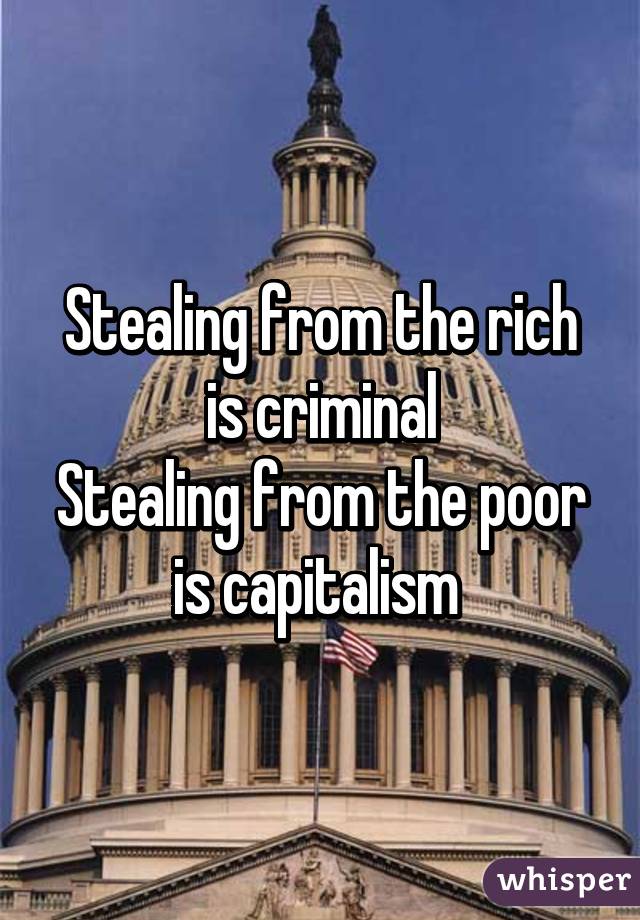
The "Occupy X" phenomenon is a long-awaited turn in the tide of how society defines crime.


Society gets much of its knowledge on anything from the Media. And the Media pays far too much attention to Blue Collar Crime, to small-time crooks and the resource disadvantaged, when they should be paying equal or even more attention to White Collar Crime and White Collar Immorality: to persons of supposed upstanding in the community, responsibility and authority who abuse the community's trust and undermine society far more extensively and sustained than shop-lifters, dope smokers and welfare scabs.

Individually, a blue-collar crim will not cause millions of dollars worth of damage or theft. A poor mum stealing some food or clothing for her family should be seen alongside the public servant stealing $16 million to buy sports cars and hookers. But these ill-fated individual decisions are nothing compared to institutional crime, which enjoys a more agreeable fate; it isn't always defined as crime when it appears in court, but described as corporate sector behaviour, or shrewd business practice. These redefined perceptions are not illegal, but account for the vast majority of the unfair distribution of a nation's wealth amongst its citizens.
We used to give our own wealth, our savings and our salaries, to Banks for protection, for security. But now we give our wealth to Banks for convenience and convention: Try living without a bank account. Yet, Banks take a carefully calculated percentage of the combined wealth we've entrusted them with and then spend it quickly before we ask for it back. They spend our money on investments, which reap a financial reward and which they collect and keep. Then, having used our money to make themselves money, they keep every cent and give none back to us. And all this is legal.
Bankers then flash our money in our faces by driving around in luxury cars, building enormous luxury houses and living luxurious lifestyles, all bought and paid for with our money, our earnings. They supplement this wealth by charging us fees for every conceivable and inconceivable banking service. In fact, Banks now make more money from charging us fees than from investing our savings. Furthermore, the credit card was invented as a response to a Bank wanting to find a way to extract more fees.
Governments take our earnings before we've seen them and remove a percentage and call it Tax. Did we give them permission? No. Not directly, anyway. And I find it quite a stretch to admit that since I voted, for or not for, a particular candidate at a recent election that this translates into me giving some unknown people a third of my earnings forever without any discussion or explanation.
Corporate criminals go to extraordinary lengths, resulting in the creation of whole industries of service providers (Marketing, Risk Management, Advertising, Public Relations...) all geared to the same ultimate goal of taking as much money from as many people as quickly as possible in exchange for offering a good or service to people who didn't need it, but now believe they do and then trying their best not to give them that good or service unless it is at the lowest affordable quality and quantity. How on earth can you get someone to pay for something they won't get, I hear you ask? Well, they use the culmination of skill and knowledge available to human beings handed down through 200,000 years of human society: they lie, they cheat, they con, they trick, the decieve, the confuse, they complicate, they hide, they collude, they conspire and when this all fails they run to the Government for help and the Government uses our Taxes to buy them out of their troubles - without our permission. Wow. How proud must their Mummies be?

Judges and legislators make laws, policies and set standards that they will never be subject to themselves. Being privileged and protected from other humans by their wealth and power, their profession is to decide how everybody else should live and within what parameters. How can someone who has always lived the life of an Aristocrat ever command how all the peasants should live?

So who's worse? The starving impoverished, the needy, the vulnerable, the destitute who didn't choose their parents well enough and have to survive within the low socio-economic brackets? Or the middle and upper class yuppies who's parent-funded education and contacts bought them opportunities and skills that were used to deceive and steal, where it's illegal, and charge a premium to the vulnerable, where it's not?
It's easy to target Blue Collar Crime, because they look like criminals. They dress, talk and behave in a manner that is not as sophisticated as those who dress in suits, drive nice cars, have the latest hair-cuts and speak with the latest vocabulary. How could someone who looks like the President be a criminal? Also, Blue Collar Crime is easy to see, it's very visible. Money is just numbers on a computer screen. No blood, no broken glass, no burnt-out cars. A TV show can show you pictures of Blue Collar Crime that will make you gasp and cringe. It's much harder to portray the theft of millions by a boring city trader, public servant or dime-a-dozen walking Suit.
The kind of crime committed by the lower socio-economic classes is completely different in character from that committed by the rich and powerful. The News of the World used private investigators to illegally gain access to hundreds of mobile phone voicemail accounts held by a variety of people of interest to the newspaper, to make a profit. They published the private affairs of grieving and vulnerable people so that they could buy that house in the Bahamas, that private finishing school education for Mindy and Mandy, the latest Ferrari, more shoes, more struggling businesses, more sweat shops, etc. The cause of the wealthy thief is shallow and decadent. The cause of the poor is just, is understandable, is necessity, is the very result of unfair wealth distribution in society.
Wealth and power buy immunity from the Law, Taxes and even Guilt, thanks to society's acceptance that the worst criminals are Blue Collar not White Collar workers. We need to focus on the real criminals.















































